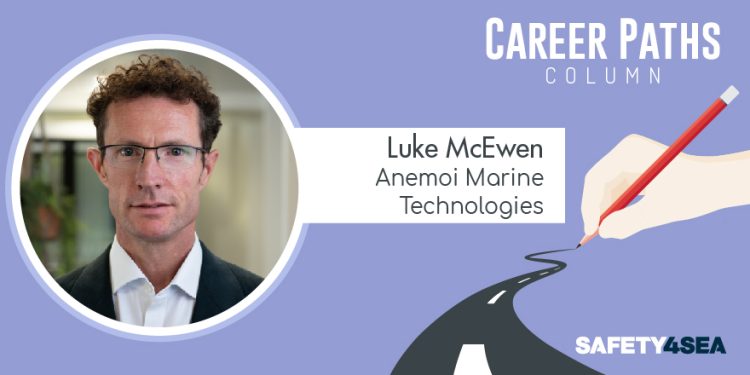search the site
Career Paths: Luke McEwen, Anemoi Marine Technologies

In our special column this time, we are pleased to share the career journey of Luke McEwen, Technical Director at Anemoi Marine Technologies. With a degree in engineering sponsored by the UK Ministry of Defence, Luke spent 22 years in engineering consultancy, collaborating with naval architects, shipyards, and other industrial clients, before ultimately joining the shipping industry.
Passionate about wind propulsion for ships, Luke views sailing as a more efficient way to harness wind energy than fuel-based methods. He emphasizes the importance of building strong partnerships with customers and advocates for integrating sailing knowledge into commercial shipping to maximize the benefits of Rotor Sails. His personal motto—”Always keep sight of what is most important”—inspires us all to always focus on what truly matters.
SAFETY4SEA: How did it come about that you joined the shipping industry and your field of expertise specifically?
Luke McEwen: I was lucky to be sponsored through my degree in engineering at Cambridge University by the UK Ministry of Defence who gave me a year of training at the Royal Naval Engineering College and sent me on summer placements to shipyards, a car factory and a big civil engineering project. For the next 22 years, I worked for an engineering consultancy whose clients were mainly naval architects, owners, yards and equipment OEMs, doing structural design and certification for sailing yachts, wind and tidal turbines, buildings, bridges and vehicles. In 2020 I officially joined the shipping sector when I joined Anemoi as Technical Director to lead the engineering design of our commercial scale Rotor Sails.
S4S: What about your current job/role most excites you and why?
L.McE.: I spent four years sailing around the world in a small yacht, watching large ships chugging across the oceans, so I am really passionate about harnessing wind power to propel ships without burning oil. Sailing is a much more efficient way to use wind energy than converting it into electricity in a wind turbine to make green fuels, which are then burnt in an engine. I love being able to combine expertise from different engineering disciplines including structural, mechanical, electrical, naval architecture and control systems, along with practical experience of the marine environment to make effective and reliable equipment.
S4S: When you think of the word successful who’s the first person who comes to mind and why?
L.McE.: Isambard Kingdom Brunel, possibly the greatest mechanical and structural engineer of recent centuries and a truly visionary leader. He pioneered the development of propeller-powered ships, steam locomotives, railways, tunnels, bridges and hospitals, as well as novel ways to build them
S4S: Who is/was the most influential person/mentor to you & why?
L.McE.: I did a student placement working on the fuel supply system for the (then new) Hong Kong airport. The very experienced and pragmatic project manager taught me hugely valuable lessons about how to manage a diverse, multidisciplinary team and how to go from concept design through to equipment delivery, dealing with all the tricky technical details on the way. These are lessons I still use to this day to help bring our Rotor Sails from the feasibility and design stages to full implementation onboard merchant vessels.
S4S: What is the best and what was the worst piece of advice you’ve ever been given and why?
L.McE.: The best advice I’ve been told is that ‘every design is perfect until it’s tested’. When it comes to the worst advice, I was once told that there is no point spending time at the yard before you start your first job as a design engineer. It took me years to catch up on practical yard experience after that mistake. This kind of experience is invaluable when it comes to understanding the real-world challenges of installing marine technologies onboard vessels and being able to prepare and mitigate those risks.
S4S: What is the most worthwhile career investment (in energy, time, money) you’ve ever made?
L.McE.:Doing a general engineering degree means I’ve been able to cover all the key disciplines to my current role as Technical Director at Anemoi. In some cases, even the ones that seemed irrelevant to my future career at the time have proven useful.
S4S: If you could give a piece of advice to your 18-year-old-self one thing, what would it be and why?
L.McE.:Keep your eyes open for opportunities. Interesting things will come along so be ready to take the good ones and say no to the rest
S4S: What piece of advice should you ignore?
L.McE.:Follow the standard big-company career path that worked for the previous generation. These days, trying to climb the ladder the traditional way does not guarantee job security and you can learn more by taking different paths, even if they may seem like career risks at the time
S4S: In the last five years, what new belief, behaviour or habit has most improved your business life?
L.McE.:Focusing on what will really help our customers. Many people in business often see customers (and their suppliers) as their adversaries when really they should be your long-term partners in a win-win relationship
S4S: What would you like to change in the current maritime landscape and your area of expertise specifically and why?
L.McE.: I’d really like to see the passion for sailing grow within commercial shipping, both on board and ashore. Sailing knowledge is not a requirement for the crew to use Rotor Sails because they are automated and can be enhanced by using voyage optimisation software to guide the ship’s best course and speed. However, with wind-propulsion technologies now commonplace in commercial shipping, it would be fantastic for operators and crew to develop skills to gain the maximum benefit from Rotor Sails.
S4S: What is your personal motto?
L.McE.: Always keep sight of what is most important.
source : safety4sea


















